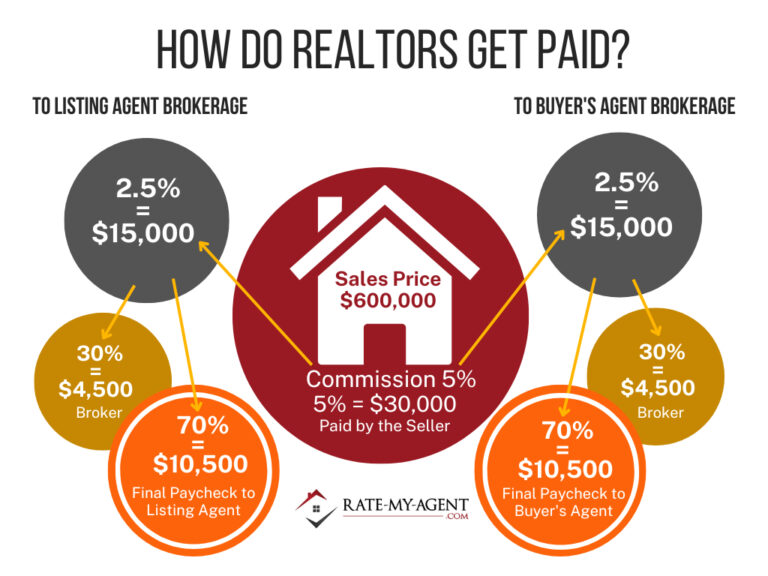
If you’ve ever considered a career in real estate, one of your first questions is probably: How much do real estate agents really make? While it can be a lucrative profession, the income varies significantly based on experience, location, market conditions, and effort. Understanding what influences a real estate agent’s earnings can help you decide if it’s the right career path—or help you understand what your agent is earning when they sell your home.
Average Income for Real Estate Agents
The average income for real estate agents varies widely depending on factors like location, experience, and the volume of transactions. According to the U.S. Bureau of Labor Statistics, the median annual wage for real estate agents was approximately $49,980 in 2023. While this is a helpful benchmark, it doesn’t reflect the full income range in the industry. Some agents, particularly those working in high-demand markets or luxury real estate sectors, can earn well over $100,000 per year. On the other hand, new or part-time agents may earn considerably less as they build their client base and reputation.
Real estate agents typically earn money through commissions, usually between 2.5% and 3% of the final sale price of a home. However, it’s important to note that this commission is often split between the buyer’s and seller’s agents. Furthermore, agents often have agreements with brokerages that require them to share a portion of their earnings. As a result, an agent might only take home a fraction—sometimes 1% to 1.5%—of the total sale price after all divisions.
For example, selling a $400,000 home might generate a $12,000 commission, split between both agents and their brokerages. The agent may ultimately pocket $3,000–$6,000 from that deal, depending on the split terms. Consistent sales volume is key to maintaining steady income. High-performing agents often close multiple deals per month, while others might only finalize a few transactions per year.
To learn how real estate agents can increase their earnings, visit our Real Estate Income Tips page. For further salary insights across states and cities, check out Indeed’s salary comparison tool.
Factors That Influence Real Estate Agent Earnings

Real estate agent income varies significantly from one professional to another, and several key factors influence how much an agent can actually earn. While many assume it’s all about commission percentages, there’s far more at play. First and foremost, location is a huge determinant of earnings. Agents operating in expensive and fast-moving markets like San Francisco, New York City, or Los Angeles often handle larger transactions and more frequent deals, which naturally results in higher income potential. Conversely, agents in smaller or rural markets may work just as hard for significantly lower average sales prices.
Experience is another critical factor. New agents often struggle to build a client base and understand the intricacies of the market, whereas seasoned agents typically benefit from referrals and repeat business. With time, agents also develop stronger negotiation skills, improved efficiency, and a deeper understanding of contracts and market trends—traits that lead to more successful closings and higher commissions.
Marketing efforts and networking play essential roles too. Agents who actively promote themselves through social media, email newsletters, open houses, and local events tend to gain greater visibility and attract more clients. These agents may also invest in staging, professional photography, and advertising, all of which enhance their listings and potentially boost earnings. However, such investments come with upfront costs, which can eat into profits—especially for agents early in their careers.
Licensing and education are ongoing expenses. Many agents continue their education to obtain additional certifications, such as becoming a licensed broker or specializing in commercial real estate. These credentials can open new income streams. For more details on maximizing your income, visit our Real Estate Career Guide.
Ultimately, earnings are shaped by hustle, strategy, and the unique market dynamics of where and how an agent chooses to work.
How Real Estate Agent Commission Works
Understanding how real estate agents earn their income starts with understanding how commissions work. In most cases, agents don’t receive a fixed salary. Instead, they earn money through commissions, which are a percentage of a property’s sale price. The industry standard is typically between 5% to 6% of the final sale price, and this amount is usually split between the buyer’s agent and the seller’s agent. Each agent’s brokerage also takes a share of that commission, which means the actual earnings per transaction can vary significantly.
For example, if a home sells for $400,000 with a 6% commission, that’s $24,000 in total commission. This amount is often split 50/50 between the buyer’s and seller’s agents—$12,000 each. From there, agents may owe a portion (usually 20–40%) to their brokerage firm, depending on their agreement. This means the final take-home pay from a $400,000 sale might be closer to $7,000 to $9,000 for each agent involved.
Commission structures can also vary by region and transaction type. In competitive markets or luxury listings, agents may negotiate different rates. Some real estate agents even offer discounted commissions to attract more clients, which can impact their earnings over time. Additionally, agents representing both the buyer and seller in a transaction (known as dual agency) may retain the entire commission, although dual agency is not legal in all states.
If you’re considering a real estate career or are curious about how much agents really earn, check out our in-depth Real Estate Career Guide. You can also explore resources from the National Association of Realtors for industry standards and updates.
Is a Career in Real Estate Worth It?
So, how much do real estate agents really make? The answer isn’t as simple as a single number—it depends on a wide range of factors including location, experience, network, niche specialization, and personal drive. While the median annual income for agents hovers around $49,980 according to the U.S. Bureau of Labor Statistics, many agents far exceed this through high-volume sales, working in luxury markets, or building strong referral pipelines. Conversely, others may struggle if they don’t treat their role as a full-time business requiring consistent effort and strategy.
Ultimately, success in real estate is about more than just selling homes—it’s about managing your time, investing in marketing, building client trust, and understanding your local market. For those who are entrepreneurial, self-motivated, and willing to continuously learn, real estate can offer both financial freedom and lifestyle flexibility.
If you’re exploring a career in real estate, or you’re a homeowner interested in understanding what your agent is earning, this guide should give you a clearer picture of the industry’s financial landscape. For more detailed insights, visit our Real Estate Career Guide and check out our blog post on How to Become a Real Estate Agent for a step-by-step breakdown of getting started.
Whether you’re considering joining the field or simply curious, remember that income potential in real estate is real—but it takes strategy, discipline, and dedication. For further learning, the National Association of Realtors offers valuable resources for agents at all stages of their careers.



